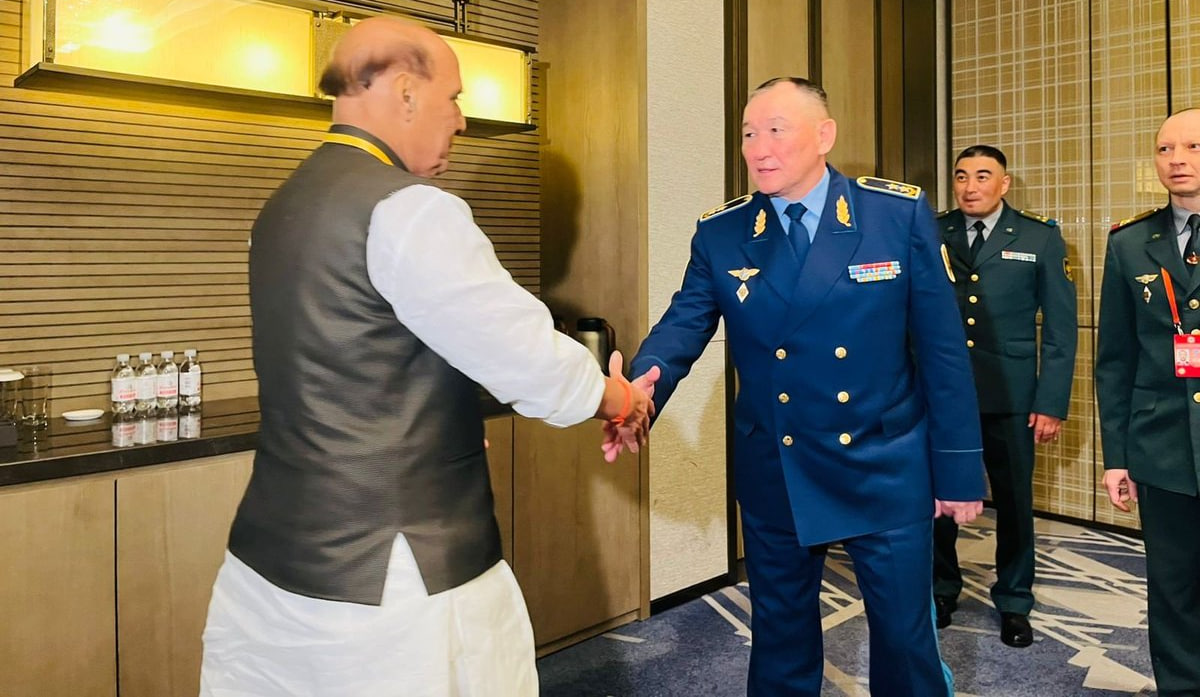



At the Shanghai Cooperation Organisation (SCO) meeting, India's Defence Minister Rajnath Singh refused to sign the joint statement. This was a protest because the draft did not include India's concerns about cross-border terrorism, specifically the Pahalgam attack, reinforcing India’s zero-tolerance policy on the issue within the China-dominated group.

Copyright infringement not intended
Picture Courtesy: INDIAN EXPRESS
At the Shanghai Cooperation Organisation (SCO) summit, India refused to sign the joint statement because it failed to address India's concerns on cross-border terrorism.
The SCO's foundation lies in the "Shanghai Five," a group formed in 1996 including China, Russia, Kazakhstan, Kyrgyzstan, and Tajikistan. Its primary goal was to address regional border security and stability following the dissolution of the Soviet Union. It officially became the SCO in 2001, expanding its focus to combat regional terrorism, separatism, and extremism.
Membership => The SCO is the world's largest regional organization in terms of geographic area and population. It currently has 10 member states: China, Russia, India, Pakistan, Kazakhstan, Kyrgyzstan, Tajikistan, Uzbekistan, Iran, and Belarus.
The organization's security agenda is driven by its Regional Anti-Terrorist Structure (RATS), headquartered in Tashkent. RATS facilitates cooperation and intelligence sharing among member states on security and terrorism-related issues.
At the recent SCO Defence Ministers' meeting in Qingdao, China, Indian Defence Minister Rajnath Singh refused to sign the joint draft statement.
Core Disagreement => India's refusal derived from the content of the document. According to the Ministry of External Affairs, the draft failed to adequately address India's core concerns regarding cross-border terrorism.
India's Stated Position => In his address, Rajnath Singh expressed India's "zero tolerance" policy. He stated that peace cannot coexist with terrorism and that nations using cross-border terrorism as an instrument of state policy must be held accountable. He condemned "double standards" on terrorism, implicitly targeting Pakistan and its allies.
Immediate Outcome => Due to India's refusal to find a consensus, no joint statement was issued from the Defence Ministers' meeting.
Asserting Strategic Autonomy in a China-Dominated Forum => The SCO has historically been influenced by Russia and China. With Russia preoccupied with the Ukraine war, China's dominance has grown. The meeting was held in China, with Beijing as the SCO chair. By refusing to sign, India sends a clear message that it will not compromise on its core national security interests, regardless of pressure from the host nation. It demonstrates India's commitment to strategic autonomy on multilateral platforms.
Directly Countering the China-Pakistan Nexus => China and Pakistan are close allies. China has used its influence in international bodies, including the UN, to shield Pakistan from resolutions related to terrorism. By taking a stand at the SCO, India directly challenged this nexus within a forum. It prevents the platform from being used to legitimize Pakistani narratives while ignoring Indian concerns.
Reinforcing the 'No Compromise on Terrorism' Policy => This action is a practical demonstration of India's foreign policy principle that "terrorism and talks cannot go together." India is making it clear that it will not support any document that dilutes its concerns or creates a moral equivalence between terrorism it suffers and the internal issues of other nations. This strengthens India's credibility and signals to the world that its stance on terror is non-negotiable.
For the Shanghai Cooperation Organisation (SCO)
Pressure on the Heads of State Summit => The focus shifts to the upcoming SCO Council of Heads of State meeting in Tianjin, China. The failure to achieve consensus at the ministerial level puts pressure on the leaders to bridge the divide. They will need to either find a compromise on the language regarding terrorism or risk another meeting without a unified declaration, which would damage the organization's prestige.
Addressing Internal Contradictions => For the SCO to remain effective, especially its Regional Anti-Terrorist Structure (RATS), it must address the fundamental disagreement on the definition and application of "terrorism." If the group cannot act impartially against all forms of terrorism, its founding purpose is weakened.
China's Role as Chair => As the SCO Chair, China's next steps are crucial. It can either use its influence to broker a neutral and acceptable compromise that respects the security concerns of all members, or it can continue to shield Pakistan.
For India
Continued Assertiveness => Use its position within the SCO to block any consensus or narrative that undermines its core national security interests. It will not be a silent participant but an active agenda-shaper.
Focus on Areas of Convergence => Engage constructively on other areas of shared interest within the SCO framework, such as promoting regional connectivity (e.g., the Chabahar Port, International North-South Transport Corridor), economic cooperation, and cultural ties.
Strengthening Parallel Alliances => Continue to diversify its diplomatic options by strengthening partnerships where there is greater alignment on security issues, such as the Quad (with the US, Japan, and Australia) and I2U2 (with Israel, the UAE, and the US). This multi-alignment strategy gives India leverage and ensures it is not solely dependent on any single bloc.
The way forward is not a retreat from the SCO but a more confident and assertive engagement by India. The onus is now on the SCO, particularly China, to demonstrate that it can function as a consensus-based organization that respects the security sensitivities of all its members, not just a select few.
Must Read Articles:
INDIA'S SCO STAND SHOW NEW REALISM
Source:
|
PRACTICE QUESTION Q. Critically evaluate the effectiveness of India's diplomatic move at the Shanghai Cooperation Organisation (SCO). Was it a necessary assertion of national interest, or did it risk alienating India within a key regional organization? |





© 2026 iasgyan. All right reserved